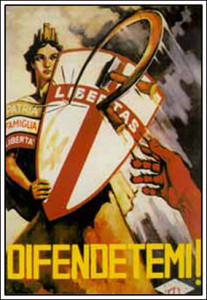 Over on his blog, Sam Harris interviews Mark Riebling, the author of Church of Spies: The Pope’s Secret War Against Hitler. The historical ground covered is interesting—how could it not be?—but these passages, in particular, caught my attention:
Over on his blog, Sam Harris interviews Mark Riebling, the author of Church of Spies: The Pope’s Secret War Against Hitler. The historical ground covered is interesting—how could it not be?—but these passages, in particular, caught my attention:
Conservative, even authoritarian, religious structures can prove extremely helpful against revolutionaries who want to impose a far more radical, utopian political religion. If Sunni Islam had a hierarchy, we would see many of its leaders resist ISIS more effectively. By comparison, you are seeing the Shia capable of counteraction, not just because they are anti-Sunni, but because they have a clerical hierarchy.
The Sunni conservatives will at some point have to either fight the revolutionaries or obey them. It was similar in Cambodia under Pol Pot—finally the old-line communists in that part of the world couldn’t take it anymore. Likewise, who is now sending troops to prop up an authoritarian Assad to stop ISIS?
The former KGB agent Vladimir Putin. Which should remind us that in the former Soviet Union, glasnost and perestroika did not come from “the Russian people.” They began within the most elite ranks of the Party—the KGB. I think the pope’s secret war against Hitler should be grouped with this family of phenomena—authoritarian resistance to totalitarianism.
And this (my emphasis added):
For half a century, the Marxist myth of the New Man was fairly successful in supplanting the old stories—but the magic’s gone out of that, too. So you have, unless you are mindful, a banalization of human experience. This banality is going to tempt some people to join ISIS for excitement, for re-enchantment, for remythification.
If you join ISIS, you have a story! Your life is numinous—it’s as if you’re living in the Iliad instead of, say, just playing soccer in the dust in a Bauhaus housing project in Basra. Or you’re channeling the Teutonic Knights while you’re horsewhipping Jews in 1930s Nuremburg—I think the personal hunger is the same.
As C.G. Jung said, you can chase out the devil, but he shows up somewhere else. Which is one reason why, when Jung was an agent for US intelligence in 1944, he urged propping up political Catholicism—in fact, through the Christian-socialist parties that came to dominate Cold War Europe, whose exiled leaders Pius sheltered in the Vatican. Jung was an atheist, but he preferred Christian socialism to the atheist communism he saw coming. He predicted that the freethinking atheist would fare better under the frowning brow of the Christian myth than under the trampling boot of the communist one.
Jung was a nut, but he had moments of clarity.
Link
http://www.samharris.org/blog/item/rethinking-hitlers-pope
